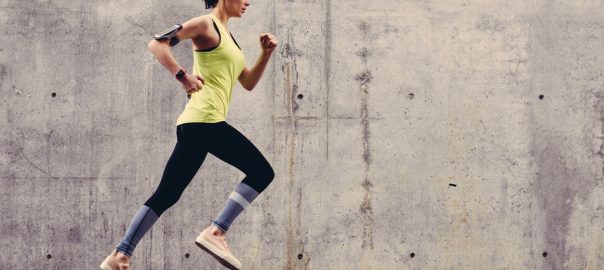
How Our Bodies Burn Calories
How We Process the Foods We Eat
Learn about how your body processes energy, what this means for weight loss and how you can boost your metabolism.
A lot of us don’t know exactly how our metabolism works. Yet, our bodies spend a lot of time executing metabolic processes because they are essential to healthy functioning and growth. Your metabolism can also play a role in how quickly or easily you are able to get in shape or lose weight, which is why it is useful to understand for those looking to optimize their health. Understanding your unique metabolic rate can help you time your meals when your metabolic rate is at its peak and know roughly how many calories a day you should be consuming.
Understanding your body’s metabolism and following its patterns can help improve digestion, energy levels and overall feelings of well-being. In this article, we explain in depth how your metabolism works and how to measure it. We will also discuss ways that you can increase your metabolism day-to-day and other tips for managing your body’s metabolic patterns.
What is Metabolism?
Your body is a living, working machine made up of trillions of cells. One of the most important functions of this bio-machine is metabolism, which is the set of important life-sustaining chemical reactions that enable these cells to convert the energy stored in molecules (say, from the food you eat and the air you breathe) into energy that can be used for other processes such as growth and reproduction.
Basal Metabolic Rate
Each person has a unique basal metabolic rate (BMR), which is the amount of calories our body is able to burn, at resting, in one day. Your BMR basically takes into account the energy required for your body to perform all of the basic functions to survive, such as breathing, digestion and excretion.
There are lots of online BMR calculators (like this one) that can give you a rough estimate of your BMR based on your weight, height, age and gender. However, these factors alone don’t tell you the complete story; your genetics and possibly other unknown factors could also play a role in your natural BMR. Even two people with the same body size and composition could have totally different metabolic rates. That is why understanding your unique BMR is useful for managing your own health.
On top of your BMR, your body may burn energy through other daily activities and physical exercise. This means that the amount of calories you burn from day to day can vary, but your BMR will stay roughly the same.
When Does Peak Metabolism Occur?
It is important to note that your BMR operates on a cycle, meaning that the rate of your metabolism actually changes throughout the day. Typically, our resting metabolic rate is highest in the afternoon, or 10 hours after waking up. So, this is the best time to indulge in a big meal, especially after a workout! We also burn the least calories two hours before waking up in the morning and a few hours before bed. This is why it is often recommended to avoid indulging in large meals or snacks early in the morning and especially late at night. Some ways to ensure that your metabolism peaks at the same time every day is to follow consistent mealtimes and to expose yourself to sunlight first thing in the morning. This helps regulate your overall body clock, which in turn, will help regulate your BMR cycle.
Metabolism and Weight Loss
The (very) basic science behind weight gain and weight loss comes down to caloric intake, which is why so many people focus on calories alone when dieting. If you are in a caloric deficit, meaning you are consuming less calories from food than your body burns on its own (your BMR) and from exercise, you will lose weight. The opposite is true (i.e. you will gain weight) if you have a caloric surplus; that is, you are consuming more calories than your body can burn in a given day. Remember that when it comes to dieting and living a healthy lifestyle, it matters more where your calories come from (i.e. healthy, clean, unprocessed food sources) rather than how much or how little you consume.
Although you can’t change your BMR, having an understanding how many calories your body typically burns at rest, plus during exercise, can help you control your caloric intake – which could aid in weight loss. For example, if you know your BMR is around 1600 calories a day and you will also burn 400 calories from exercise in a given day (from walking, running, cycling, swimming, etc.), then you should eat roughly 2000 calories a day to maintain a healthy weight.
Can You Speed Up Your Metabolism?
The answer to this question is sort of ambiguous – yes and no! In a long-term sense, no, you cannot actively change your BMR. That said, it can change on its own, typically as you age. And, as we mentioned previously, you can change your physical activity levels to change the total number of calories you burn in a day aside from your BMR.
The other part of the answer is yes, it is possible to create small, short-term changes in your metabolic rate during the day. The techniques are interesting to discover and could be useful to know for optimizing your diet and workout regimen, but they are not likely to have any serious impact on weight loss.
Aerobic Exercise
Aerobic exercise (anything that gets your breathing and heart rate to increase) can temporarily speed up your metabolism after your workout. Certain hormones are released during exercise, that cause your metabolic rate to rise. These hormones can remain in the bloodstream for varying amounts of time after a workout, depending on the person (anywhere from a few to 24 hours). So, this is why some say it is best to save a meal for after a workout and eat a light pre-workout snack before you exercise, so you have enough energy to perform.
Building Muscle
Muscles require more energy to function than other types of tissues in your body. For example, each pound of muscle in your body burns 6 calories a day, fat tissue burns just 2 calories a day. So, building up your muscle tissue might be one way to alter your BMR slightly. This is also part of the reason why men tend to have higher BMRs than women, since they naturally have more of muscle tissue than women. Building muscle becomes even more important when you get older, as you naturally lose muscle mass with age.
Caffeine
Several people reach for a cup of coffee or tea in the morning to kick start their metabolism for the day, because caffeine does increase the rate at which your body burns energy. Caffeine can also act as an appetite suppressant until you decide to eat later in the day, when your BMR has increased. Green or oolong tea are also great options metabolism-boosting hot beverages that have many other health benefits. The antioxidants in green and oolong tea have been shown to help prevent a number of chronic diseases as well as slow the effects of aging. Just remember to stay hydrated with water as well when consuming coffee and tea during the day, as both of these drinks have diuretic effects which can cause dehydration and slow down the metabolism.
Metabolism-Boosting Foods
Certain foods can also increase your metabolism for a short time after eating them. These include:
- Chili and cayenne pepper. Both of these contain metabolism-boosting capsaicin.
- Try adding 2g of ginger powder to hot water and having it with meals to help you burn more calories from your food and increase feelings of satiety!
- Lemon water. Many people will drink a glass of water with lemon juice and cayenne pepper first thing in the morning to boost hydration and metabolism after a long night of rest.
- Apple cider vinegar. ACV improves digestion, slows the emptying of the stomach and increases feelings of fullness in the mornings. Be sure to limit intake of ACV to 2 tablespoons (30mL) a day.
- Raw cacao or cocoa powder. Try adding it to smoothies, yogurt and cereals!
Protein-Rich Foods
Increasing your intake of protein is another way to burn more calories throughout the day. This is because it takes our cells more energy to digest protein molecules than it does for fats or carbohydrates. While it is always important to maintain a balanced diet, including a source of protein with every meal or snack is a great way to increase your metabolism and stay satiated (it can also help with building those muscles, too!). Good sources of protein include fish, white meat like chicken and turkey, tofu, nuts, beans and other legumes, eggs and dairy products. Try to buy grass-fed, farm-raised or organic when possible and avoid processed meats such as bacon and sausages. The Low Carb Grocery offers a variety of protein rich foods that are also low in carbs. Make sure to check them out here.
Coconut Oil and MCT Oil
Coconut and MCT oil have experienced recent popularity among low carb dieters and people trying to lose weight. The type of fat molecules (medium-chain triglycerides) found in coconuts are less likely to be stored as fat by the body. This is because they are immediately converted into a type of usable energy, called ketones, when consumed. If you are on a ketogenic diet, taking MCT oil can help you stay in ketosis. If you are not in ketosis, the body first tries to burn through its stores of carbohydrates for energy before burning fat. This means that less fat is being burned, which suggests why some people may struggle to lose weight while consuming a high carb diet, and others may not – all in accordance with our individual BMRs.
A Word on Water
The body requires water to process calories. Even a slight dip in hydration during the day can cause your metabolism to slow down, as well as cause other negative physical and mental side effects. Be sure to drink enough water consistently throughout the day and whenever feelings of thirst strike (note that you may already be dehydrated before the onset of any symptoms!). Snacking on crunchy, water-filled fruits and vegetables is also a great way to stay hydrated between meals. It is also wise to avoid consuming excessive amounts of coffee, tea, sodium and alcohol, which can dehydrate you even further.
Stay Connected
We hope that you learned something and enjoyed reading this article. If you would like to share your thoughts or experiences, head over to our Facebook and Instagram pages. We also love to read our reviews on Google, so if you enjoyed an experience you had with The Low Carb Grocery, please take a minute to let us know here!
Check out our Weekly Newsletters, too, for updates on the latest products and special sales!






